- Home
- Peter Benchley
Rummies Page 2
Rummies Read online
Page 2
But one of Preston’s spiritual lifeguards had escaped drowning in the sea of four double vodkas, and now it called out to him from a remote beach in the back of his brain, “Don’t be an imbecile!"
So he restricted himself to a cordial “Morning, Miss Prinze,” and turned to the corridor that led to his office.
He collided with Dave Diamond, who was coming to retrieve a delivery from Miss Prinze.
“Hey, buddy,” said Diamond. "How you feeling? You look better.”
“Great!" Preston replied truthfully. “Just what I needed." He marched off to his office without stopping to decipher Diamond's look of vague distaste—as if he had swallowed a tainted clam.
Preston's office looked down on Park Avenue. The door was always left open so that his secretary (she preferred “editorial assistant”), Debbie Browning, whose workstation was a closet in a fetid corridor, could reassure herself that there existed a world without ducts. Now, for some reason, the door was closed.
Debbie looked like a young Margaret Thatcher, and indeed around M&S she was known as the Iron Maiden. She intended to be an editor—no, she intended to be the editor—and her work was her life. Preston assumed that she slept on the crosstown bus, because in addition to her forty-hour week for him, she worked on nights and weekends as a free-lance copy editor, read every esoteric quarterly in the land and clipped promising poems and stories, with which she besieged him each morning, and not only read every manuscript he edited but offered gratuitous detailed critiques of the writing, the editing and the typesetting.
She was a royal pain in the ass.
“Hi, Deb," Preston said. “Anything cooking?"
He expected to be handed a stack of phone messages and slapped with a sly rebuke about lax work habits.
Instead, this woman who believed that direct eye contact was a key to success, this paragon who could stare down a cobra, refused to look at him and said only, “Mr. Preston, I'm truly sorry."
"What?"
“I wish you the best of luck." She sniffled and sprang to her feet. “I mean that sincerely."
“That's very nice of you, but—"
She scuttled off toward the ladies' room, making a sound—whuck whuck whuck--like a. dog with a bone in its craw.
Metabolic, Preston concluded. It must be a metabolic thing, like his sweating. She should consider taking Tryptophane. These mood swings weren't healthy.
He opened the door to his office.
Weeks later, from a prospect of some serenity, Preston would recall with amazement the speed with which his mind had received, dissected, interpreted and reacted to the sudden flood of unexpected information that greeted him when he opened the door. The concept of a nanosecond had always struck him as being as boggling as the concept of infinity—something that Man is not really meant to grasp, that doesn't exist except as an excuse for the endowment of highly paid chairs at Ivy League universities—and yet it seemed that in less than a nanosecond he was able to determine that: his parents had died, Margaret's parents had died, Kimberly had been expelled from Princeton Day School, Margaret was divorcing him to marry Warren Storrow, Kimberly had been arrested for selling cocaine. Mason & Storrow was going out of business, and he was being replaced as executive vice president and senior editor by Chris Evert.
Four people were in his office: Margaret, Kimberly, Warren and a woman who, on second glance, was older and flintier than Chris Evert. They sat in straight-backed chairs arrayed in a semicircle with their backs to his desk. A fifth chair had been placed at the focus of the semicircle.
They did not look happy. Margaret, in fact, appeared to be possessed by a fulminating, barely controlled fury Preston had seen but a few times before in his seventeen years of marriage, most recently late in the evening of her parents' thirty-fifth-wedding-anniversary celebration when her father had launched into one of his litanies of kike jokes and Gullah stories and Preston had called him a troglodyte asshole.
Kimberly looked nauseated. Warren looked gorgeous, as always, with his Tiffany collar pin perfectly straight and his helmet of Leslie Nielsen hair perfectly sculpted, but Preston could tell he was uncomfortable by the way his thumbs were exploring his cuticles. Chris Evert looked as impassive as Torquemada at an auto-da-fe.
''Come in, Scott," Warren said. ''Shut the door." He pointed to the empty chair.
"What have we here?" Preston said because he felt he had to say something. “This Is Your Life?" No one smiled. "What's going on? Somebody hurt?"
Chris Evert said, “A lot of people, Scott."
“Who’re you?''
“Her name is Dolores Stark, Scott," said Warren. “We asked her here to help you ... to help us."
“Help us what?" Preston tossed his briefcase onto his desk and went to one of the windows overlooking Park Avenue. It was hot in here. He was starting to sweat again. He opened the window a few inches and turned around and leaned on the sill. He was damned if he would sit in that chair and be a bull's-eye. As long as he was standing, he retained a measure of control.
Dolores Stark said, “Sit down, Scott," and she pointed at the chair.
“I’m fine here. No problem. Now tell me—"
“Scott!" Warren barked. Preston had never before heard Warren bark, had thought him to be—like many WASPs, like himself—incapable of raising his voice, lacking the barking chromosome. “Sit down!"
Stunned, Preston walked meekly to the chair and sat. He could think of no jocular crack. Besides, Warren's Doberman tones had told him two important things: This little get-together was about him, and it was serious. What have I done? He revved his mental motor and tried to anticipate their complaints. I am an extremely careful person—thoughtful, even. I do not insult strangers, I do not belittle waiters, I do not browbeat subordinates. On those rare occasions when I take afternoon naps in the office after wooing bibulous authors at lunch, I cover my tracks like an Apache. I do my work conscientiously and well. Authors ask for me to be assigned to them.
Dolores Stark said, “How many drinks did you have on the way in this morning?"
Preston froze. His heart may have stopped, and surely his breath did. A bizarre recollection commandeered his mind. A year ago, one of his younger authors, a gifted storyteller but afflicted with a chronic compulsion to articulate the abysses of human experience that even Saul Bellow hadn't plumbed, had written a sentence that Preston excised as pretentious bushwa: “I felt as if he had punched me in the soul."
Preston owed the lad an apology. Dolores Stark had just punched him in the soul.
All he said was "I ovevslept.”
Margaret exploded. “Like hell! You were passed out in the living room. I left you lying there."
“I was not passed out. I was asleep because ..." Think! Think! “. . because when I went to bed you were snoring so badly that—"
"Bullshit!" Margaret never said words like ''bullshit." Ever. "On the floor? With all your clothes on?"
Preston expected Margaret to come out of her seat like a pilot ejecting from a burning plane, until Dolores Stark leaned over and touched Margaret's knee and turned to Preston and said, in a voice as calm as a windless sea, "How many, Scott? How many drinks this morning?"
She thinks she's got me. But I will become a handful of eels. Maybe the building will catch fire. Maybe an earthquake will strike.
"Look, the train broke down in the Meadowlands. ..." As if that explained it all. As if he expected her to lean back and say, "Oh, no wonder! Then I guess we can adjourn. Sorry to bother you."
Preston wondered if perhaps he was going mad.
“Are you trying to tell me you didn't have any drinks this morning, Scott?"
“I’m not trying to tell you anyth—“
“Because you smell like a distillery."
“I do not! That's . . . that's ..."
“Impossible? Were you going to say ‘impossible'?" Dolores Stark smiled, not unkindly. “Because you ate a bunch of mints? Come on, Scott. Never try to shit a shitter."<
br />
Sweat coursed down Preston's scalp, dripped off his hair and into his ears. He opened his collar button, loosened his tie. He turned to Warren, who was examining his knuckles.
“Why are you doing this, Warren?"
Dolores Stark answered. 'This is what we call an intervention, Scott."
"I'm not talking to you!"
"Fine, Scott. Talk to Warren, then." She shifted her gaze to Warren and locked it on him, as if injecting him with her strength.
Warren shot an angry glance at Dolores Stark. He probably hired her to be the assassin, Preston thought, and she put the knife in, but now she's forcing him to turn it.
"Scott ..." Warren said. "We want to help you see what we see. We want to help you help yourself, before it's too late."
"I do my work. I do it damn well. And you know it." Stupid! You've just begged him to find fault with you. He’ll be on your back like a baboon looking for lice.
Warren's jaw set and his skin tone darkened a shade as he looked directly into Preston's eyes.
“On February sixteenth at seven p.m., you called Paul Sanders in Pennsylvania and spoke with him about a proposal for a novel."
Warren paused, and Preston said, "Guilty."
"On February seventeenth at ten a.m., you called him again and began to repeat the entire conversation, as if the one the night before had never occurred. You had forgotten it. Every word."
Oh shit. "No! I just wanted to clear up—"
"On January twentieth, you had lunch with Nat Brower and agreed on an advance for a book. Weeks later, his agent called Accounting and asked where the papers were. You had never submitted them, had never cleared the advance with me."
"Oh. Well. It must've-"
"What was the figure, Scott? How much did you agree to pay?"
Preston's shorts were soaked. A searing spasm shot through his lower bowel. "Offhand? I can't—"
"Would you like me to go on?" Warren pulled a sheet of paper from his pocket.
Preston looked at his shoes. They were nice shoes. From Brooks Brothers. Old and comfortable, made supple by a thousand applications of Meltonian Cream. Good-bye, shoes.
Dolores Stark held up a hand to Warren. She said softly, "Margaret?"
Preston looked at Margaret. She was clutching her purse in a death grip, as if trying valiantly to transfer all her bilious fury to that leather sack.
When she spoke, her voice was flat, dead. “When was the last time Kimmie had friends home, Scott?”
The question struck Preston as petty, inane. “When was the last time you had your legs waxed? How the hell should I know?"
“It was months ago, Scott, months and months ago. And do you know why? Because she doesn't dare bring her friends home anymore because she never knows what kind of shape you're going to be in and it's no fun to be humiliated by your own father."
Resentment bred with anger spawned recklessness. "That's nonsense! I never—"
“No, you never vomited on the living-room floor or fell down the stairs. But do you remember the night you were in the kitchen having a little Stoly from the freezer and Kimmie and Wendy Porter came in and you said with a cute little leer on your face that you thought Mary Benson had a really nice pair of hooters?"
"I ..." He did not remember.
"I didn't think so. How about her birthday last year when she had a slumber party and you decided it would be jolly to put on some ‘good' music and dance—just you and your friend Johnnie Walker and SIX FIFTEEN-YEAR-OLD GIRLS!"
Preston saw the veins on Margaret's temples pulsing, and he imagined rivulets of poison dripping from her lips.
Kimberly put her head in her hands and sobbed. Preston said, “Kimmie . . ." He wanted to go to her, to hold her, but he felt dirty, as if his touch would contaminate her. So he lashed out at Margaret. “Why did you bring her here? Why are you so cruel?''
“Because she's part of you, Scott," said Dolores Stark. “Everyone here is part of you. Everyone your life touches becomes a co-alcoholic with you.”
“Whoa! Just whoa!" The four syllables of the forbidden word had pushed Preston's reflexive trigger. “Don't you steamroll me, lady. I may be a bad guy now and then, but I am not an alcoholic."
“I see." A nauseatingly beatific smile played on her face.
How serene she was, how imperturbable, how . . . superior. She seemed to anticipate his every response. Was he so boringly predictable?
“No fucking way," he said, using the proscribed F-word to demonstrate conviction and determination. And to rattle Dolores Stark.
She smiled again. “So what do you propose to do about being a bad guy, Scott?"
“I’ll quit."
Margaret snorted.
“No, I mean it. Seriously. I know I've quit before, but that was just to prove I could. I didn't have any motive to really quit. But now I do." Preston warmed to his own argument. He saw an escape. “This has been really helpful for me. I didn't see that I was affecting other people. But now that I have, now that you've made me see it, I'll quit. Once and for all."
He smiled at them all, imploring them to believe this facade of gratitude, hoping that none of them could see behind it to the scenario rolling before his eyes: a beaker of iced Stohchnaya floating on a bar, reflections of mahogany dancing in the diamond liquid.
“When, Scott?" Dolores Stark asked.
“When what?"
“When are you going to quit?"
The answer was in his mouth. He intended to say, “Right now," or ''This minute." There was no percentage in telling them the truth because they wouldn't understand that it takes a couple of days to taper off properly.
But before a word could be shaped by his thick tongue, Dolores Stark said, ''Monday, right?"
He stared at her. The bitch is psychic.
"You don't want to quit on a weekend. You can't do it. Nobody can. It's unreasonable to try. There are just too many pressures. You're bound to fail. And then you feel even worse." She paused. And then that accursed smile again. "Right, Scott?"
Preston's mouth must have been hanging open, for he felt a breeze on his teeth. He whispered, "Right."
"You're not going to quit, Scott."
He was hypnotized. "I'm not?"
"No, because you can't. We think we can, and we try, we really do try, and we do quit. For a week or ten days or two weeks or, some of us, for a month or two. But we always go back." She wasn't smiling now. "No, Scott, there's only one way, and that's the way you have to take."
"What's that?"
Dolores Stark looked at Margaret and Kimberly and Warren—a final confirmation of unanimity—and then said to Preston, "We want you to go into treatment."
"Huh?" It took a beat for the euphemism to register and then to shed its nicety and reappear as the monster it was. "A loony bin? Me? Forget it." Preston didn't realize he was shouting until he heard Warren's stem voice in soft contrast to his own shrill protests.
“We didn't come here to vote on it, Scott. The only choice you have is: You can go into treatment, or you can get fired."
“And divorced," Margaret added.
Preston swallowed acid. “Nice, Warren, really nice. Judge and jury . . . Look, I can't just hop on a plane and-"
Warren reached inside his jacket and withdrew an airline-ticket folder. "One o'clock, JFK to Santa Fe."
“Santa Fe? What's in Santa Fe?"
“The Banner Clinic."
"Banner! That's a lush bin!"
Dolores Stark leaned forward and smiled. "And . . . ?"
He ignored her. "Who's gonna pay for it? These places have to cost—"
"Insurance," said Warren. "Every dime."
"But . . . but . . ." Doors were slamming in Preston's head, shutting off avenues of escape. "I don't have any clothes. I don't even have a toothbrush!"
Preston saw that, unwittingly, he had given Margaret a cue. Sucking in her cheeks and cocking an eyebrow to show smarmy righteousness (one of her more annoying personal habits), she stood
and went behind his desk and returned with a packed suitcase, which she deposited on the floor before him.
Preston sensed that he was falling through a slick dark cylinder with no bottom. He put out a hand to Warren. "What about the Benson book? It needs a lot of work. And the Gregory. The Gregory is in big—"
“I’ll take the Benson. And I thought I'd give Debbie a crack at the Gregory . . . show what she can do on her own.”
"Debbie?" Preston said, gagging. "Debbie Browning?"
"She's talented, Scott. You've said so yourself."
I'm being gang-banged from every quarter. "Jesus, Warren, it's great to be indispensable."
"It's because we do need you that we're doing this, Scott. If we didn't care, I'd give you your walking papers right now."
Dolores Stark nodded to Kimberly.
With quavering voice barely audible, Kimberly said, "We don't want to lose you. Daddy."
Preston slumped in his chair and squeezed his eyes. These people have no decency. They will stop at nothing.
Dolores Stark rose and went to Preston and put a hand on his shoulder. He loathed being touched by strangers. He recoiled, but she did not remove her hand. She smiled. Of course. Nothing surprised this woman.
"Bet you wish you had a drink right now."
Impulsively, ludicrously, Preston began to deny it, but then he saw in her eyes a wisdom born of pain and exuding sympathy. He believed for the first time that she truly knew things about him that he didn't. Wordlessly, he nodded.
"I did, too." She grinned. "When they came for me five years ago, I raced into the John and drank a quart of Scope."
Preston was appalled at the effect her words had on him. Even as he reacted, he didn't believe it. He felt that she had just kissed him—not sexually but spiritually—and that the kiss had somehow shrunk the tumor of loneliness that had been blooming in his guts. He gaped at her.
Still smiling, she said, “Let's have a shooter, then.”
Margaret jerked in her chair. Kimberly bounced as if hers were on fire. Warren frowned and smoothed his hair and said, "Actually, I'm not entirely sure that's . . ." He trailed off. But none of them did anything.
Dolores Stark circled the room, gazing at the bookcases, reciting titles to herself. She stopped and stood on tiptoe and pulled a book off a top shelf. She read the title aloud: "A la Recherche du Temps Perdu."

 Peter Benchley's Creature
Peter Benchley's Creature The Island
The Island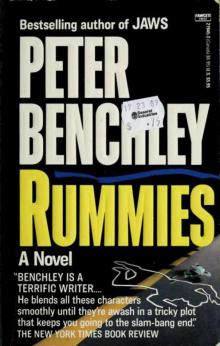 Rummies
Rummies The Girl of the Sea of Cortez: A Novel
The Girl of the Sea of Cortez: A Novel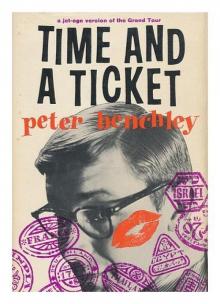 Time and a Ticket
Time and a Ticket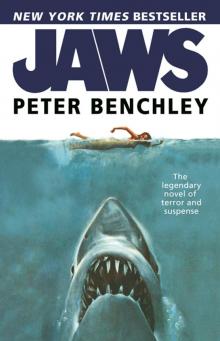 Jaws
Jaws The Deep
The Deep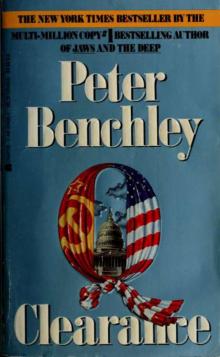 Q Clearance
Q Clearance Shark Trouble: True Stories and Lessons About the Sea
Shark Trouble: True Stories and Lessons About the Sea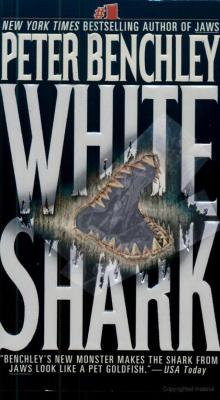 White Shark
White Shark Shark Trouble
Shark Trouble Shark Life: True Stories About Sharks & the Sea
Shark Life: True Stories About Sharks & the Sea